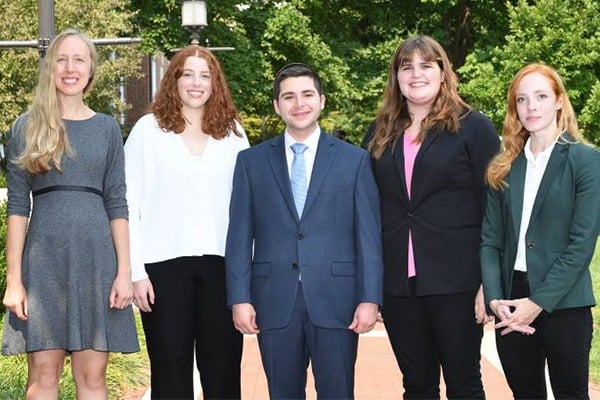Selected for their exceptional academic performance and outstanding leadership, four Johns Hopkins University PhD students studying biomedical engineering have been named Siebel Scholars for 2022.
Since its founding in 2000, the Siebel Scholarship has been awarded to 65 Johns Hopkins graduate students. This year’s recipients are among 82 honorees from top universities. They join a formidable network of more than 1,600 researchers, scholars, and entrepreneurs. Recipients receive a $35,000 award to support their final year of studies.
“This year’s cohort of Seibel Scholars embody the commitment to discovery, collaboration, innovation, and to making an impact on the world that fuel all that we do at the Whiting School,” said Ed Schlesinger, Benjamin T. Rome Dean of the Whiting School of Engineering. “I am tremendously proud of our students and their accomplishments and am grateful for the Siebel Foundation’s support and their recognition of the school’s leadership in bioengineering.”
The Johns Hopkins BME 2022 Siebel Scholars are:
Elana Ben-Akiva
Elana Ben-Akiva completed her degree in biological engineering at the Massachusetts Institute of Technology and is now a doctoral candidate in JHU’s Department of Biomedical Engineering. A National Science Foundation and National Institutes of Health fellow, she works to develop biomimetic polymeric particle therapeutics for enhanced drug delivery, with particular focus on designing next-generation biomaterials at the interface of engineering and immunology for cancer immunotherapy applications. This research has led to 10 co-authored publications, one patent, and several conference presentations. She designed and developed the curriculum and was a lecturer for four semesters of a master’s-level course on immunoengineering, for which she received “Best New Instructor Award” from Johns Hopkins Engineering for Professionals program. Passionate about mentoring younger students, she has supervised 14 high school, undergraduate, and graduate students in the lab. She is also active in Thread, a Baltimore-based non-profit whose mission is to help underperforming young people thrive, and through which she leads a group of volunteers mentoring high school students.
Ariel Isser
Ariel Yosef Isser studied bioengineering at University of Maryland College Park, where he conducted research in three laboratories, received the “Most Outstanding Senior” award, co-founded an AEMB Biomedical Engineering Honors Society chapter, and established a departmental tutoring program. Now a doctoral candidate in JHU’s Department of Biomedical Engineering, he has received National Science Foundation and National Institutes of Health F31 fellowships to engineer the first material platform to activate T helper cells for cancer immunotherapy. He mentored 10 undergraduate and graduate students, and produced eight publications and 12 national conference presentations, winning multiple research awards. He also designed and taught an undergraduate immunoengineering course, mentored three Baltimore City high school students through P-TECH, and served as education chair for the PhD Council. An executive board member of BME EDGE, a student-run professional development organization, for four years and co-chair for two, he helped implement department-wide changes to enhance professional development training.
Alexandra Rindone
A member of Warren Grayson‘s laboratory in JHU’s Department of Biomedical Engineering, Lexi Rindone is developing a quantitative 3D imaging platform to analyze the interactions of blood vessels and osteoprogenitors during bone regeneration. To carry out her research, she has established multiple interdisciplinary collaborations both at Johns Hopkins and at the University of Ottawa, where she visited Daniel Coutu’s lab to train in specialized bone imaging techniques. She has co-authored eight manuscripts and received several awards for her work, including a National Science Foundation Graduate Research Fellowship, a National Institutes of Health F31 Fellowship, ARCS/MWC Hesse Endowment Scholar award, and a National Center for Women & Information Technology Collegiate Award honorable mention. She also is the chair-elect for the Student and Young Investigator Section of TERMIS Americas, and currently co-leads a global virtual seminar series for young scientists in the society. At Hopkins, she served for four years on the BME PhD Council, establishing a student-faculty liaison position, and organizing department events to foster connections within the BME community. She is also a passionate educator who has taught a JHU intersession course on clinical orthopedics and mentored three PhD students and seven undergraduates in her lab.
Julie Shade
Julie Shade works in Biomedical Engineering Professor Natalia Trayanova‘s lab, where she pioneered the integration of virtual heart models with machine learning to develop advanced clinical cardiology decision support tools. Shade has co-authored nine publications and pre-prints, given numerous conference presentations, and served as a TA for four courses. She has mentored three students in lab and five students as the lead data scientist at Oncospace Inc., a FastForward startup. Shade is a National Science Foundation Graduate Research Fellow and was recently named a finalist for the Heart Rhythm Society Young Investigator Award for leading development of a continuously updating model to forecast cardiovascular complications in COVID-19 patients. She is passionate about diversity and inclusion in STEM, assisting students with PhD/fellowship applications through BME-Application Assistance and other initiatives. She also has volunteered with P-TECH and Vex-IQ robotics, successfully advocated for increased departmental accessibility (including accessible PhD recruitment activities), and has served on the BME PhD council as outreach co-chair and first-year representative.
Alycen Wiacek, a PhD candidate in the JHU’s Department of Electrical and Computer Engineering, has also been named a 2022 Siebel Scholar.
Read more on the Hub.
– Lisa Ercolano

